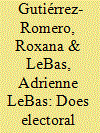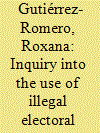| Srl | Item |
| 1 |
ID:
170806


|
|
|
|
|
| Summary/Abstract |
Across many new democracies, voters routinely elect candidates associated with violence. Though electoral violence is common, there is little understanding of how it affects voting behaviour. This article examines how electoral violence affects turnout and vote choice. To this end, a vignette experiment is set in a nationally representative survey in Kenya, where electoral violence has been present since the 1990s. In the experiment, voters choose between two rival politicians. The experiment randomizes candidates’ attributes, their rumoured use of electoral violence and their record of reducing poverty. Conjoint analysis is used to isolate the effects of the candidates’ randomized attributes on turnout and vote choice. In contrast to the assumptions made in the literature on electoral violence, voters are less likely to vote for candidates rumoured to have used electoral violence, even when the candidate is a coethnic or a copartisan. This sanctioning effect, however, is not consistent across all voters. Victims of electoral violence and the poorest respondents are less likely to sanction candidates rumoured to have used violence, especially when these candidates have a good record of reducing poverty. The results show that voting turnout decreases when participants are asked to choose between candidates who are rumoured to have used electoral violence. These results are robust to including respondent and interviewer characteristics that might have affected participation in the experiment and how respondents voted. These findings explain why candidates using violence can win elections and why electoral violence has been difficult to eradicate in settings characterized by clientelism and instances of political discourse justifying the use of violence.
|
|
|
|
|
|
|
|
|
|
|
|
|
|
|
|
| 2 |
ID:
134946


|
|
|
|
|
| Summary/Abstract |
This article investigates whether vote-buying and the instigation of violence in the disputed 2007 Kenyan elections were strategically motivated and whether those affected by vote-buying or post-electoral violence changed their views toward ethnopolitics and the use of violence. To answer these questions, a panel survey conducted before and after the elections is combined with external indicators of electoral violence. We find that vote-buying was used to mobilize parties’ own strongholds. Political parties also targeted vote-buying and threats toward specific ethnic groups and areas, potentially to weaken the support of their political rivals. In addition, we find that the victims of post-electoral violence are more likely to identify in ethnic terms and support the use of violence. The non-victims of post-electoral violence, but who experienced vote-buying after our first survey are also more likely to support the use of violence.
|
|
|
|
|
|
|
|
|
|
|
|
|
|
|
|